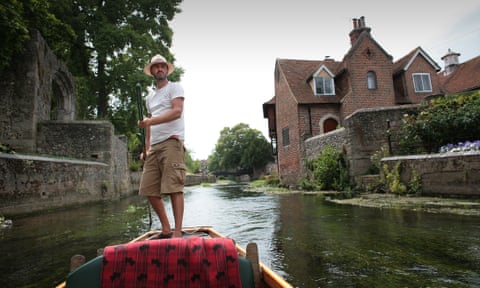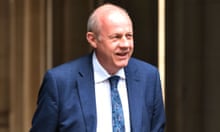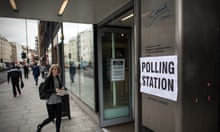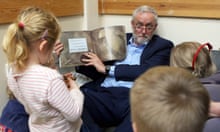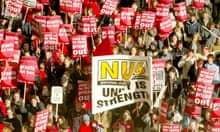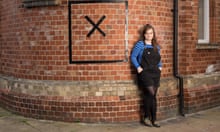The day before the deadline to register to vote in the general election, Conor Fitzmaurice went knocking on doors at the University of Kent’s halls of residence.
Clutching leaflets on how to register, he told his fellow students they needed to make their voices heard. Although a member of the Labour party for three years, the 25-year-old politics and international relations student did not proselytise for Jeremy Corbyn, nor for local candidate Rosie Duffield. He said. “It was just: get out and make a difference.”
They did.
In the run-up to the election, Canterbury registered 8,000 new voters, most of them students. Then on 8 June, to the dismay of local and national Conservatives, the constituency broke with a century of returning a Tory MP. When the announcement came, just before 3.30am, that Duffield had taken the seat for Labour by a margin of 187 votes, overturning a Conservative majority of close to 10,000, it was a significant moment in an extraordinary night for Corbyn’s Labour party – and one that came to be seen as a symbol of just how confounding an election it was.
As the initial shock receded, an interesting fact emerged. Sir Julian Brazier, the incumbent MP for the past 30 years, had actually increased his vote by almost 2,500 – his best personal result for 25 years. But this achievement was eclipsed by a surge in Labour support. The party’s share of the vote rose by an astonishing 20%, from 24.5% two years ago to 45% now. That double-surge was, to some extent, the story of the election nationwide.
In Canterbury, it was, by nearly all accounts, the student vote that was decisive. “At the polling station on campus, there were queues out of the door all day,” said Fitzmaurice. Hannah Marendziuk-Uglow, a solicitor who works at the Kent Law Clinic on campus, confirmed this: “I sat in my office on election day watching the queues to vote. It was obvious something big was happening.”
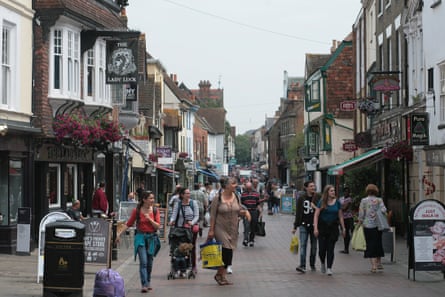
Brazier himself acknowledged the students’ impact, and his failure to recognise the shift. “We had by far the biggest concentration of students in the country – that was a really big factor,” he told BBC Radio Kent. “We should have had a better message for them … It was only the last couple of days we began to realise that we weren’t really reaching the young people.”
In the 10 years to 2015, Canterbury’s student population doubled to 40,000, producing one of the highest ratios of students to general population in the country. The campuses of both main universities, Kent and Canterbury Christ Church, have undergone a construction boom. Last month, the council approved Canterbury Christ Church’s £150m redevelopment plan for the city’s 19th-century prison, where the Kray twins once resided.
For several years, Canterbury students have had the potential to influence or even determine election outcomes, but relatively few took part in the democratic process. In the 12 months leading up to June’s election, however, two seismic events shocked them into action. The EU referendum produced a 51% to 49% vote in favour of Brexit in the Canterbury area, a blow to young adults in a city which describes itself as the “gateway to Europe” and who saw their future as Europeans. A few months later, Donald Trump won the US presidency.
“The difference between 2015 and 2017 was Brexit and Trump,” said Marendziuk-Uglow. “I said to young people – not just students, but those struggling on minimum wage jobs or zero-hours contracts – if you think things will get better on their own, you’d better think again. Unless you exercise your right to vote you can’t take anything for granted.”
Labour’s pledge to abolish tuition fees is likely to have influenced some students, although Fitzmaurice said it was outweighed by other factors. “I can understand the argument that the tuition fees pledge was a blatant bribe, but I don’t think it was the main thing,” he said. “People just like the idea of a fairer society, and the Conservatives simply weren’t offering any hope.”
Hannah Page, 24, who graduated from Canterbury Christ Church two years ago and now works as a barista in a city centre coffee shop, seized her chance to contribute to a historic shift. “I couldn’t believe that a politician like Corbyn had come along in my lifetime,” she said. “He’s passionate, genuine, environmental. His manifesto was a leftwing dream. For a while some people weren’t sure whether to trust him, but all my friends got behind him in the end.”
A week after election day, the universities’ terms ended and most students left the city. At the other end of the political spectrum to Page, lifelong Conservative supporter Karen Roberts, 57, was infuriated.
“The trouble with students is they are very transient. They don’t live and work in Canterbury like local people. So it’s a bit annoying that they have decided the outcome, when it won’t affect them in any shape or form,” she said. Theresa May, she added, should have been more careful with the timing of the election. “It was a big error. They should have called it for after the end of term.”
But the student vote was not the only factor in the surprise result. Canterbury has seen an influx of new residents: young professionals priced out of the London housing market, attracted by affordable properties and the high-speed rail link, which has brought the city within an hour of the capital. Many are thought to be more inclined to support Labour.

Despite the affluent feel to the city – reinforced by its Unesco world heritage site status, stunning cathedral, ancient city walls, cobbled streets and punts on the river Stour – there are pockets of deprivation. “It looks good on a postcard, but there is real poverty in Canterbury. Under the surface, people are struggling to make ends meet and are fed up with austerity,” Duffield told the Guardian.
As well as this, there has been vigorous local opposition to plans to downgrade the Kent and Canterbury hospital by stripping it of specialist services and half its junior doctors.
Labour worked on a plan to maximise local disaffection with the Tories. According to Mike Bland, Duffield’s campaign manager, it had four main elements: voter registration, building a “coalition of support”, deploying social media, and highlighting the appeal of its candidate.
“We ran a number of registration campaigns, working with the council and student bodies. It wasn’t just focused on students: we also did a lot of work in schools. On election day, the very first polling station I went to was reporting a huge turnout of young people, and it wasn’t in a big student area,” he said. .
“We ran a social media campaign, and found we were getting higher and higher reach and contact. [Shadow foreign secretary] Emily Thornberry came down, and we put a segment on her speech saying the outcome of the election was ‘in your hands’ on social media – and it got 50,000 views. At first we thought social media would reach young people, but it turns out that people of all ages use Facebook and Twitter. We cut across the negativity of the media.
“We had a very visible public presence, and we had real conversations with voters. One of our winning points was we had the right candidate, and we highlighted the differences between her and Brazier: young, female, progressive, vibrant – or white, male, entitled, anti-gay marriage and pro-fox hunting.”
Local Conservatives acknowledge that Duffield’s profile and personality were factors, and some suggest Brazier was complacent. But some also say tactical voting played a part, pointing to sharp falls in the Lib Dem and Green votes. Ukip, which got a 13% share of the vote two years ago, did not field a candidate this time, with some of its supporters returning to Labour, according to Bland.

On the banks of the Stour this week, business was slow for Westgate Punts as overcast skies threatened rain. Jeremy Macleod, who has been punting tourists along the river for 15 years since leaving the University of Kent, had time to reflect on the election.
Macleod, 37, a railway worker’s son from Southend, voted Labour for the first time: in previous elections he voted Green or not at all. “For the first time in my lifetime, the Labour party is showing the promise of becoming the party that I was told about as a child but never saw any evidence of,” he said.
He grew up under a Tory government, but was deeply disillusioned by New Labour. “I never found a real political home,” he said. Then two years ago, Corbyn was elected party leader, and Macleod signed up as a member. “I knew I wanted to be a part of that.”
Momentum, the grassroots pro-Corbyn group within the Labour party, had been “really proactive” in Canterbury during the election, he said. “They were out in the villages and on the estates, and they got a good response.” The British public was more leftwing than it thought itself to be, he added.
“Canterbury may once have been a solid Tory town but it’s changing. It’s growing very fast, the universities have been massively expanding, with building work everywhere – much more ethnically diverse. There’s always been a quite progressive element here but many people were apathetic.
“Now the students will tell next year’s intake: we made a difference. You don’t have to accept things as they are.”
